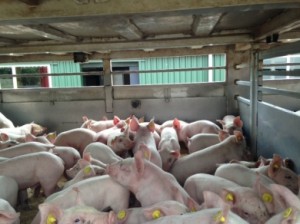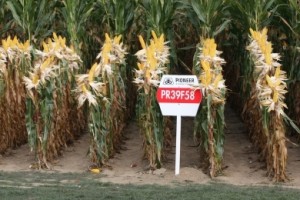Worldlog Tjedan 6 – 2014
Kontrola transporta životinja će se konačno vratiti natrag u javne ruke. U 2011 sam u vezi ovoga već podnijela zahtjev , koji je također podržan od strane većine parlamenta, ali morali smo pričekati do 2014 da državna tajnica shvati da se ovako ne može dalje nastaviti. Državna tajnica iz Ministarstva gospodarstva, Dijksma, prošlog tjedna je napokon izjavila da više ne prihvaća sadašnji sistem nadzora i kontrole prijevoza životinja i da će preuzeti odgovornost za ovu kontrolu natrag u svoje ruke.
Svake godine, milijune životinja se transportiraju u kamionima preko granice. Tokom transporta životinje često teško pate. Životinje stoje često više od osam sati u pretrpanim kamionima bez hrane i vode. Propisi za zaštitu životinja se slabo poštuju i budžet za državni nadzor u posljednjih nekoliko godina je drastično smanjen. Ovo znači da samoregulacija prijevoza životinja ne funkcijoniše. Parlament je bio jasan: Vlada se treba baviti onim za što je namjenjena, naime prepisivanjem standarda, nadzorom i provedbi. Analogno tome, kontrola brzine na cestama se isto tako ne leže u ruke samih vozača. Drago nam je da se nadzor prijvoza životinja konačno vraća u javne ruke i mi će mo se nastaviti boriti da se ovakvo igranje sa životima životinja zaustavi!
Moja kolegica Esther Ouwehand se prošlog tjedna jako angažirala protiv uvođenja novog genetski manipuliranog usjeva u Evropskoj Uniji (EU). Europska komisija bi uskoro mogla dopustiti sijanje genetski manipulirane vrste kukuruza, 1507, koju proizvodi tvrtka Pioneer. Ako se to dogodi, sve zemlje EU moraju isto tako dopustiti sijanje ovog kontroveznog usjeva na svojim područjima.
Zemlje koje žele izbjeći bilo kakve rizike s genetskom modifikacijom, kao što su Austrija i Francuska, već neko vrijeme prigovaraju. Nizozemska još uvijek nije jasno odredila svoj stav u vezi GMO usjeva, iako bih Nizozemski glas može biti odlučujući faktor budućnost što se tiče priznanja genetski manipuliranih usjeva u EU. Mi smo našu Vladu stoga pozvali da da prednost slobodi izbora građana, poljoprivrednika i država EU i da glasa protiv odobrenja novih genetski modificiranih usjeva.
Mi odlučno odbacujemo genetsku manipulaciju i mislimo da države u svakom slučaju ne bih smjele biti prisiljene da dopuste rast genetski manipuliranih usjeva na vlastitoj zemlji. Kontroverzni kukuruz od tvrtke Pioneer je genetski manipulirana biljka koja kontinuirano emitira otrov. Taj otrov, koji biljka sama proizvodi, dizajniran je za isključivanje kukuruznog moljca, ali pored toga šteti ostale moljce i leptire. Nadalje, biljka je modificirana da bude rezistentna na pesticide koje sadrže glufosinat. Dok znanstvenici upozoravaju da stvaranje usjeva otpornih na pesticide povišava upotrebu agrokemikalija , Brisel planira omogućiti gentsko manipulirani usjev koji je rezistentan na sredstvo (naime glufosinat) koje stvara visoki rizik za sisavce i ostale organizme. Baš zbog opasnosti od glufosinata, nastoji se smanjiti korištenje ovakvih pesticida. Nadam se da i naša Vlada također vidi opasnost genetski modificiranog kukuruza i da će se izjanisiti protiv planova Europske komisije!
Deprimirajuće je čitati kako ide s Bugarskom i Rumunjskom. Pročitajte ovdje blog u The Economistu o situaciji u tim zemljama.
I ovog tjedna želim podjeliti fotografiju od “@Fascinatingpics” sa vama: Freefall!
Do sljedećeg tjedna!
Marianne
The control of animal transportation will at last go back into the hands of the government. In 2011, I already laid down a motion on this, which was then also supported by the majority, yet we had to wait until 2014 before the State Secretary finally realised that animal transportation couldn’t go on like this. State Secretary Dijksma of Economic Affairs finally informed us last week that she no longer acknowledges the supervision and control system of the animal transportation industry and that she is taking responsibility into her own hands again.
Each year, millions of animals are transported across the borders. Those transportations regularly involve animal suffering. Animals often have to stand in overcrowded lorries for more than eight hours without any food or water. Animal protection regulations are seriously violated and drastic cuts were imposed on government control over the past years. Self-regulation within the animal transportation industry is obviously not working. The Lower House was clear: The government must do what it is there to do, namely to set standards, and to control and maintain them. You would not opt for car drivers to perform their own speed checks either. We are glad that the supervision is given back to the government and we will continue to do our best to stop them mucking about with animals.
Last week, my colleague Esther Ouwehand made out a case against the introduction of a new GM crop in the EU. It is feared that the European Commission will permit the growing of the genetically modified maize line 1507 of Pioneer. If that happens, all European Member States will have to allow the growing of the controversial crop on their lands.
Countries that do not want to run risks with genetically engineered foods like Austria and France have been objecting for a long time. The Netherlands has still not made clear its position on this, while this can be the determining factor in reaching a decision on permitting this crop in the entire EU. We have therefore urged our government to put the choice of civilians, agriculturists and Member States first and foremost, and to vote against permitting such new GM crops.
We resolutely reject genetic modification and feel that no country should be forced to have GM crops grow on their lands. The controversial maize of Pioneer is a genetically modified plant, which releases a poisonous substance. The poison produced by the plant itself is intended to eliminate the corn borer, but is harmful to butterflies and moths at the same time. Additionally, the plant has been made resistant to pesticides containing gluphosinate. While scientists warn that the use of pesticides will increase when crops are made resistant, Brussels is on the verge of accepting a GM crop that is resistant against a pesticide that has great risks for mammals and other organisms. Because of the dangers of gluphosinate, it is tried to restrain the use of this pesticide. Hopefully our government will also see the dangers of allowing genetically modified maize and stop it!
It is depressing to read how Bulgaria and Romania are doing. Read here the blog in the Economist about the situation in those two countries.
And this week again a picture of @Fascinatingpics: Freefall!
Until next week!
Marianne

